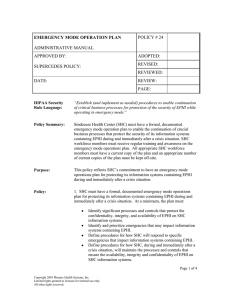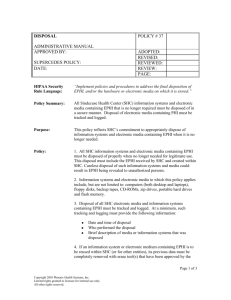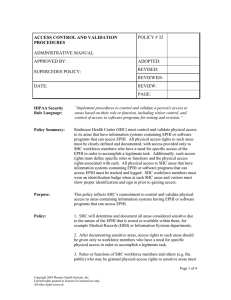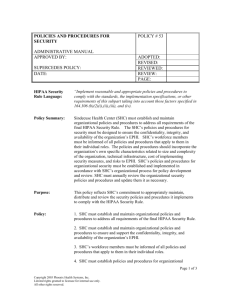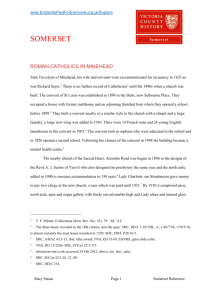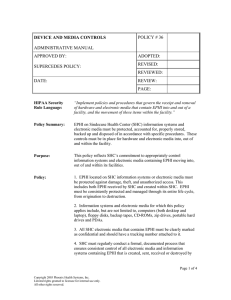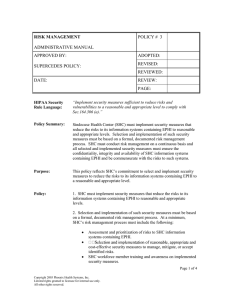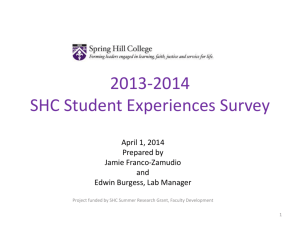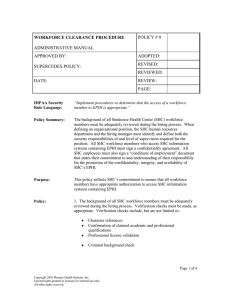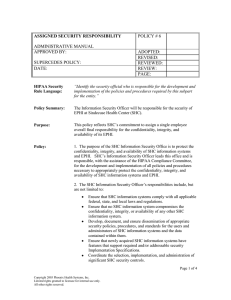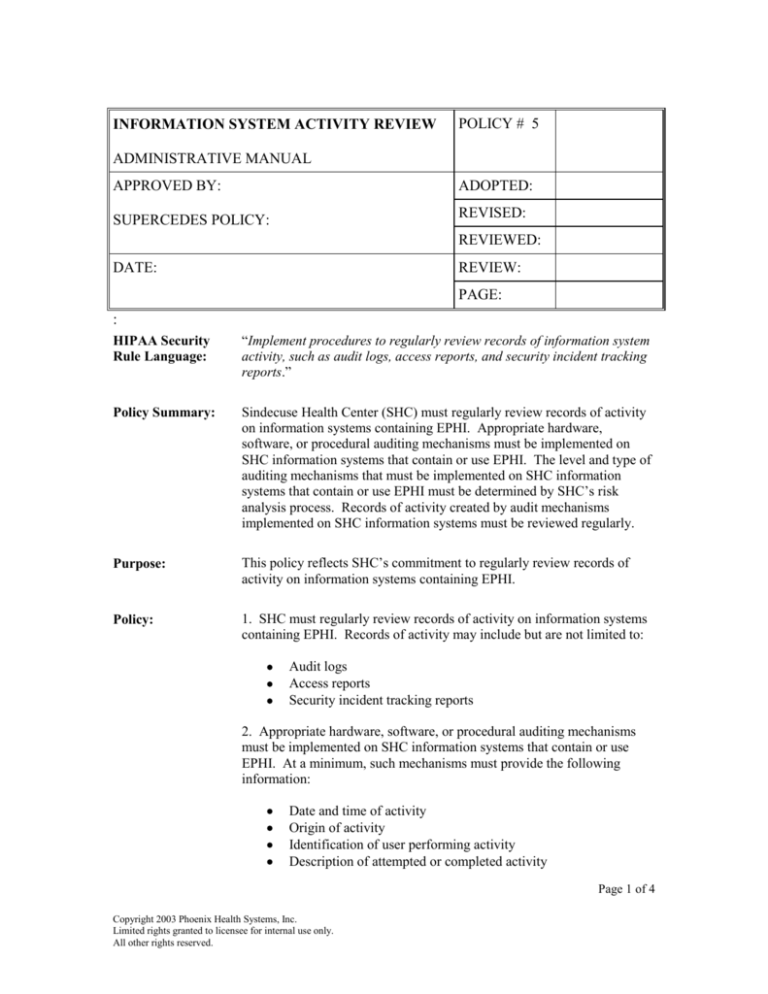
INFORMATION SYSTEM ACTIVITY REVIEW
POLICY # 5
ADMINISTRATIVE MANUAL
APPROVED BY:
ADOPTED:
SUPERCEDES POLICY:
REVISED:
REVIEWED:
DATE:
REVIEW:
PAGE:
:
HIPAA Security
Rule Language:
“Implement procedures to regularly review records of information system
activity, such as audit logs, access reports, and security incident tracking
reports.”
Policy Summary:
Sindecuse Health Center (SHC) must regularly review records of activity
on information systems containing EPHI. Appropriate hardware,
software, or procedural auditing mechanisms must be implemented on
SHC information systems that contain or use EPHI. The level and type of
auditing mechanisms that must be implemented on SHC information
systems that contain or use EPHI must be determined by SHC’s risk
analysis process. Records of activity created by audit mechanisms
implemented on SHC information systems must be reviewed regularly.
Purpose:
This policy reflects SHC’s commitment to regularly review records of
activity on information systems containing EPHI.
Policy:
1. SHC must regularly review records of activity on information systems
containing EPHI. Records of activity may include but are not limited to:
Audit logs
Access reports
Security incident tracking reports
2. Appropriate hardware, software, or procedural auditing mechanisms
must be implemented on SHC information systems that contain or use
EPHI. At a minimum, such mechanisms must provide the following
information:
Date and time of activity
Origin of activity
Identification of user performing activity
Description of attempted or completed activity
Page 1 of 4
Copyright 2003 Phoenix Health Systems, Inc.
Limited rights granted to licensee for internal use only.
All other rights reserved.
INFORMATION SYSTEM ACTIVITY REVIEW
3. The level and type of auditing mechanisms that must be implemented
on SHC information systems that contain or use EPHI must be determined
by SHC’s risk analysis process. Auditable events can include but are not
limited to:
Access of sensitive data, such as HIV results or patients who are
VIPs
Use of audit software programs or utilities
Use of a privileged account
Information system start-up or stop
Failed authentication attempts
Security incidents
4. Records of activity created by audit mechanisms implemented on SHC
information systems must be reviewed regularly. The frequency of such
review must be determined by SHC’s risk analysis. At a minimum, the
risk analysis must consider the following factors:
The importance of the applications operating on the information
system
The value or sensitivity of the data on the information system
The extent to which the information system is connected to other
information systems
5. Such review must be via a formal documented process. At a minimum,
the process must include:
Definition of which workforce members will review records of
activity
Definition of what activity is significant
Definition of which activity records need to be archived and for
what period of time
Procedures defining how significant activity will be identified and
reported
Procedures for preserving records of significant activity
6. Whenever possible, SHC workforce members should not monitor or
review activity related to their own user account.
Scope/Applicability: This policy is applicable to all departments that use or disclose electronic
protected health information for any purposes.
This policy’s scope includes all electronic protected health information, as
described in Definitions below.
Page 2 of 4
Copyright 2003 Phoenix Health Systems, Inc.
Limited rights granted to [licensee for internal use only.
All other rights reserved.
INFORMATION SYSTEM ACTIVITY REVIEW
Regulatory
Category:
Administrative Safeguards
Regulatory Type:
REQUIRED Implementation Specification for Security Management
Standard
Regulatory
Reference:
45 CFR 164.308(a)(1)(ii)(D)
Definitions:
Electronic protected health information means individually identifiable
health information that is:
Transmitted by electronic media
Maintained in electronic media
Electronic media means:
(1) Electronic storage media including memory devices in computers
(hard drives) and any removable/transportable digital memory medium,
such as magnetic tape or disk, optical disk, or digital memory card; or
(2) Transmission media used to exchange information already in
electronic storage media. Transmission media include, for example, the
internet (wide-open), extranet (using internet technology to link a business
with information accessible only to collaborating parties), leased lines,
dial-up lines, private networks, and the physical movement of
removable/transportable electronic storage media. Certain transmissions,
including of paper, via facsimile, and of voice, via telephone, are not
considered to be transmissions via electronic media, because the
information being exchanged did not exist in electronic form before the
transmission.
Information system means an interconnected set of information resources
under the same direct management control that shares common
functionality. A system normally includes hardware, software,
information, data, applications, communications, and people.
Workforce member means employees, volunteers, and other persons
whose conduct, in the performance of work for a covered entity, is under
the direct control of such entity, whether or not they are paid by the
covered entity. This includes full and part time employees, affiliates,
associates, students, volunteers, and staff from third party entities who
provide service to the covered entity.
Security incident means the attempted or successful unauthorized access,
use, disclosure, modification, or destruction of information or interference
Page 3 of 4
Copyright 2003 Phoenix Health Systems, Inc.
Limited rights granted to [licensee for internal use only.
All other rights reserved.
INFORMATION SYSTEM ACTIVITY REVIEW
with system operations in an information system.
Responsible
Department:
QI Medical Records subcommittee
Policy Authority/
Enforcement:
SHC’s Security Official is responsible for monitoring and enforcement of
this policy, in accordance with Procedure # (TBD).
Related Policies:
Security Management Process
Risk Analysis
Risk Management
Sanction Policy
Audit Controls
Security Incident Procedures
Response and Reporting
Renewal/Review:
This policy is to be reviewed annually to determine if the policy complies
with current HIPAA Security regulations. In the event that significant
related regulatory changes occur, the policy will be reviewed and updated
as needed.
Procedures:
TBD
Page 4 of 4
Copyright 2003 Phoenix Health Systems, Inc.
Limited rights granted to [licensee for internal use only.
All other rights reserved.

